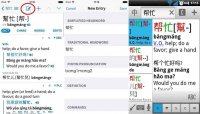I just began using Pleco's flashcard system for real this past month and finally decided to import about 2,000 cards that I previously created in Anki while I was studying a different textbook. I imported the flashcards into a user dictionary because I like to have the textbook's definitions as a reference when I look up words in the dictionary that I may have forgotten. This all worked wonderfully and I was really happy with the whole process until I realized that there were a lot of duplicate cards (between my old and new textbook, etc) that Pleco couldn't find because I didn't import any traditional characters. For all the cards with traditional variants that I didn't import, Pleco will match that definition up with other dictionaries when I search in the dictionary, but Pleco doesn't consider the flashcards to be duplicates. So I'm wondering:
1. Is there a setting or something that I missed that will make Pleco ignore the fact that a card's headword is missing traditional characters and find these duplicates anyway?
2. Or, even better, is there any way I can add the traditional characters to all the user dictionary entries that don't have them?
3. Or, if there is no way to fix this problem with my current user dictionary, is there a way I can reimport the words from the text files with traditional characters? The reason that I didn't import traditional along with simplified in the first place is that the text files I'm using are in the format: Traditional <tab> Simplified (if it exists) <tab> Pinyin <tab> Definition and I couldn't figure out any easy way to use Excel, etc to put the traditional in brackets directly after the simplified as Pleco requires (I just moved things around and deleted the traditional). I'll attach an example of one of the text files.
Hopefully someone can shed some light on how to fix this. Thank you!!
1. Is there a setting or something that I missed that will make Pleco ignore the fact that a card's headword is missing traditional characters and find these duplicates anyway?
2. Or, even better, is there any way I can add the traditional characters to all the user dictionary entries that don't have them?
3. Or, if there is no way to fix this problem with my current user dictionary, is there a way I can reimport the words from the text files with traditional characters? The reason that I didn't import traditional along with simplified in the first place is that the text files I'm using are in the format: Traditional <tab> Simplified (if it exists) <tab> Pinyin <tab> Definition and I couldn't figure out any easy way to use Excel, etc to put the traditional in brackets directly after the simplified as Pleco requires (I just moved things around and deleted the traditional). I'll attach an example of one of the text files.
Hopefully someone can shed some light on how to fix this. Thank you!!

